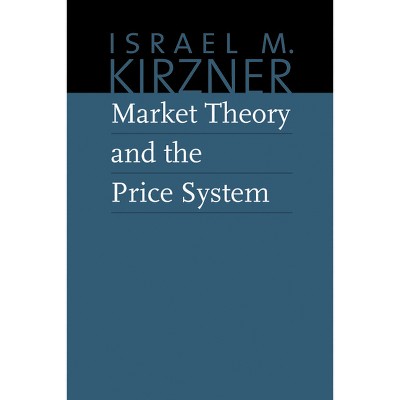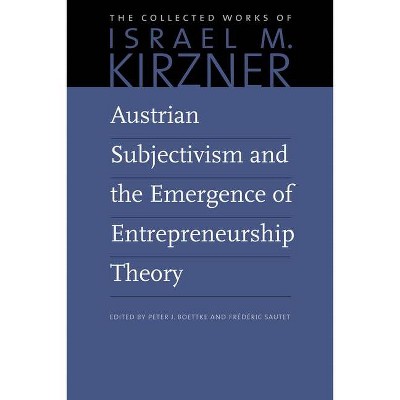The Economic Point of View - (Collected Works of Israel M. Kirzner) by Israel M Kirzner (Hardcover)

About this item
Highlights
- The inaugural volume in Liberty Fund's new Collected Works of Israel M. Kirzner series established Kirzner as a careful and meticulous scholar of economics.
- Author(s): Israel M Kirzner
- 272 Pages
- Business + Money Management, Economic History
- Series Name: Collected Works of Israel M. Kirzner
Description
Book Synopsis
The inaugural volume in Liberty Fund's new Collected Works of Israel M. Kirzner series established Kirzner as a careful and meticulous scholar of economics. No other living economist is so closely associated with the Austrian School of economics as Israel M. Kirzner, Professor Emeritus of Economics at New York University. He has been a leader of the generation of Austrian School economists following Ludwig von Mises and F. A. Hayek.
In this work, Kirzner explains how the "economic point of view" emerged in the development of economic science since the eighteenth century and through it, the concepts of purpose, subjectivism, and rationality. Kirzner's incomparable ability to navigate through the core ideas of economics helps the reader become progressively familiar with the history of the discipline and its definition.
Within the seven chapters, Kirzner discusses such subjects as the science of wealth and welfare; the nature of economic science and the significance of macroeconomics; and the sciences as human action.
Israel M. Kirzner is a leading economist in the Austrian School and Professor Emeritus of Economics at New York University.
Peter J. Boettke is University Professor of Economics and Philosophy at George Mason University and the BB&T Professor for the Study of Capitalism at the Mercatus Center.
Frédéric Sautet is a visiting associate professor of economics at the Catholic University of America. Previously, he has taught at George Mason University, New York University, and the University of Paris Dauphine.
Review Quotes
Certain thinkers in a field rise far and above all others in their field to grant new ideas. The Economic Point of View: The Collected Works of Israel M. Kirzner is the collected essays of Kirzner, an Austrian economist who is highly revered in scholarly circles that discuss economics. Here, his writings lay out his beliefs and ideas with much evidence on how he believes the world of money works in the modern era. Drawing on debates Kirzner engaged in and other sources, The Economic Point of View is an intellectual and educational read that belongs on any economics research shelf.
The Midwest Book Review
March 2010
Praise for the Previous Edition
...The Economic Point of View can be recommended both to the specialist and to those intrepid amateurs who are willing to struggle with its style and its numerous references to the literature in the field. It is probably the best single reference book now available on the history of the discussion of what constitutes "the eco-nomic point of view." Kirzner traces the discussion from ap-proximately the time of Adam Smith, when economics was thought to be a wealth-centered study, through the period when it was thought to be centered on man in his wealth--getting activities, to the more modern definitions of eco-nomics as a science of human action (the praxeological view of economics, associated particularly with the name of Pro-fessor Mises).
Those who are tempted to ask, "What difference does it make how economics is defined?", would do well to read this book and find out. For example, the early definitions of eco-nomics in terms of wealth-getting were partly responsible for the low repute of the science. Its concern seemed to be only with the "vulgar" activities of man or when he was operating at his worst. The praxeological view, in which economics is viewed as the study of man in the process of making rational choices among alternatives, relieves economics of much of the stigma that was once attached to it for definitional reasons alone. This is a reference book that every economist, profes-sional or amateur, should have on his shelf--after reading.
National Book Foundation
February 15, 1962





